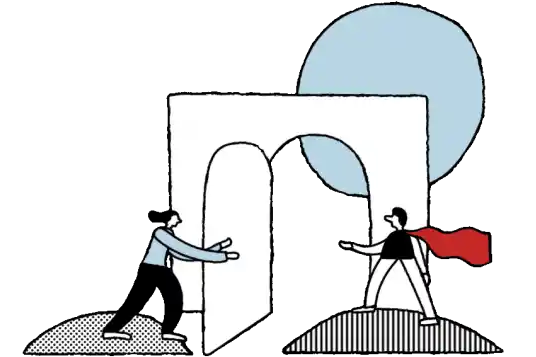

In connection with last year’s Conversion Jam, Conversionista awarded the Conversion Hero of the Year prize for the first time. The goal is to highlight outstanding individuals who have worked tirelessly to achieve success in their experimentation programs and who actively share their knowledge of CRO.
Many talented professionals competed for the title, all of whom are ambassadors for CRO. Dina Doder, Director of E-commerce and Digital Channels at Norwegian, secured the Conversion Super Hero of the Year award in fierce competition. What does she think about receiving the award, especially being the first one? And what tips can she share?
Undeniably a bit surreal. There were many strong candidates on stage who I thought deserved to win, but it was, of course, fantastic to be recognized for something you work on every day. Overall, it’s very, very enjoyable.
In retrospect, I think it’s a few things we didn’t necessarily think much about from the start. Firstly, we had the opportunity to create our own unit—a small, almost autonomous team—which I believe was very important. This way, it didn’t become "office politics." In a centralized test program, you don’t need much discussion or many layers of approval. Things can move quite quickly.
Secondly, we are fortunate to work with a website that has a lot of traffic, allowing us to run many tests in parallel.
Thirdly, we also gave ourselves time to mature. The ambition was to get started quickly, but we realized we needed time to find the right approach. What we do today, we didn’t do four years ago.
So, autonomy, traffic, and time have been our three key ingredients.
You always remember the tests that come as surprises. The very first test was "one for the books." We added a message on the page where you choose food. That test landed extremely positively—we didn’t see that coming. And since we handle a lot of traffic, the numbers were quite significant. Another memorable moment is all the tests you were sure would be winners—but weren’t. Or the opposite: small changes you didn’t think would add much but ended up making a significant impact. It’s a bit magical to be around.
When you start working data-driven, you realize that what you think you know doesn’t actually have much value. CRO creates a kind of prism where you can see things from the customer’s perspective. And then there’s no turning back. You can’t just try a bit of CRO and then rewind, saying, "No, now we’ll go back doing what we think is best”. Once you go, you can never go back.
We have good routines in place and a solid understanding of experiments. We’ve also become better at maintaining speed and interpreting business needs early on, balancing business against customer needs. It would be very easy—and comfortable—to continue doing what we do today, but we want to keep evolving.
One of the things we want to focus on moving forward is personalization. It’s an important challenge to tackle. How can we drive personalized tests? And how can we get better at quickly realizing the value of winning tests? We also want to explore how CRO can become an even more crucial ingredient in our business development. Through A/B tests ("painted door tests" and similar), we can gain a deeper understanding of what we should and shouldn’t work on. Further down the line, there’s also a decentralized test program that reaches more areas of the business.
Honestly, I find it challenging to stay updated. My approach is a combination of delving into professional literature, squeezing in some seminars to catch the major trends and tendencies, and never stopping being curious about our own customers. I try to keep an eye on what’s just around the corner, where AI is an obvious focus. At the same time, I always want to stay connected to what people are doing in our store here and now. What signals can we capture, and what pain points can we identify/address? It’s important.
What struck me during Conversion Jam, with all the wise people on stage, is that they all say it’s a bottom-up movement. Being able to produce value and show early on what has a right to exist should be a wake-up call for any management team. Therefore, it feels very strange that you always have to work bottom-up to prove just that?! But if we can’t change reality, we have to adapt to it. So my tip is:
Spread the word. Share the results. Find the arenas where you meet your colleagues, stakeholders, and management team. Share things, because A/B testing is fun and very concrete. We measured these parameters, saw significant results, which had this specific effect. You don’t need to be a designer or analyst to understand. Often, CRO teams can get a bit nerdy—so try to keep it at a reasonable level. Create simple one-pagers that tell about the tests. Organize competitions, prizes, keep it light-hearted.
The moment someone meets you with, "I see there’s an A/B test out," you know something is starting to happen outside your own team.
Be part of an unforgettable event on October 17th, 2024, in Stockholm, filled with insights, inspiration, and the celebration of the brightest minds in CRO.
Ready to accelerate your digital growth? Add your details and we’ll get back to you.
